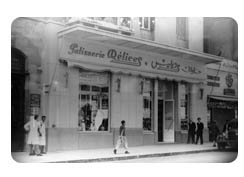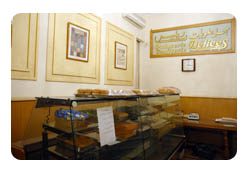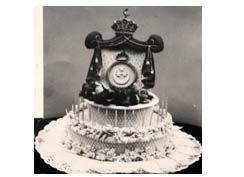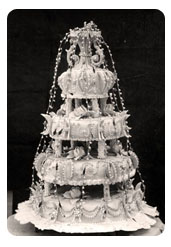
Round about the same time as Athineos was established, Délices was also established in Ramleh station on the Corniche by a Greek, Cleovoulos Moustakas, in 1900. However, the official opening was in 1922, when all the legal papers were finalized. The name was also given in 1922, when a French lady told Mr. Moustakas admiringly that the pastries were “une merveille de délices.”
The shop started out as a bakery, pastry shop, chocolaterie, salon de thé and confectionary. There were machines to make dragée (sugar-coated almonds) and bonbons as well as dandourma, the ice cream they were famous for. They were also famous for their mango and strawberry syrup. The employees and chefs were mostly Alexandrian Greeks, and most famous of them all was Stelios Koumoutsos, the waiter who was obsessed with digging for the grave of Alexander the Great.

Délices was one of the favorite haunts of the cosmopolitan Alexandrian society, who went there to sip tea and choose from the delicious variety of cakes and pastries such as mille feuilles, baba, croissant and Palermo, cassatta, meringue and profiteroles. They could sit either on wicker chairs outside and watch the world go by, or choose the fancier seats inside. In addition, catering was possible for those who wanted special teas served in their homes. Greek, Italian and French receptions were organized by Délices. Weddings and children’s birthdays (including cakes and ice cream baskets were also prepared, for the well-known Alexandrian families, and for the royal family as well. The wedding cake of King Farouk was baked by Délices, as was his coronation cake. After the revolution of 1952, the family of Gamal Abdel Nasser, the president of Egypt, continued the tradition of patronizing Délices, and their weddings were organized by the famous pastry shop. Rosenthal, Sèvres, and Limoges made special plates, bonbonnières and ashtrays with Délices stamped at the bottom.

Délices is associated with a number of occasions. It was the Alexandrian custom, after a Greek funeral, to have a coffee and biscuit at Délices. And after church mass held on the fortieth day after death, brioche and colivo were served by Délices. For Christmas, the traditional bûche, brioche Vasilopita, and Finikia Kourabiedes filled the shop. For Easter, they offered the traditional chocolate eggs which were made in the same way since 1922 and which are still being made in the same way.
Other Easter goodies are the Tsoureki, the brioche with colored eggs, and Koulourakia with sesame. During the Christian fast they offer fasting pastries such as Esli and Skaltsonia. The façade of the shop is also decorated according to the season. The establishment is now being run by the grandson, Ioannis Antoniou, who tries to be true to the spirit of Délices while keeping up with the changing times. For instance, most of the recipes have stayed the same, with some few changes. The establishment has been renovated and a restaurant section added. Tourists often stop at Délices, to have a coffee or a meal, or to buy the famous dates with chocolate. It is fast becoming once more the trademark of the city center of Alexandria.

Last Ramadan a tent was set up for the first time, in keeping with the tradition that evolved around 15 years ago of the tents pitched in Ramadan, where mint tea is offered with backgammon and shisha, the water pipe that also became popular round the same time. Délices served loukoumades, kunaffa and qatayef – traditional Ramadan sweets – in the tent. The change from Rosenthal to water pipes is symbolic of the changes that are blowing over Alexandria.